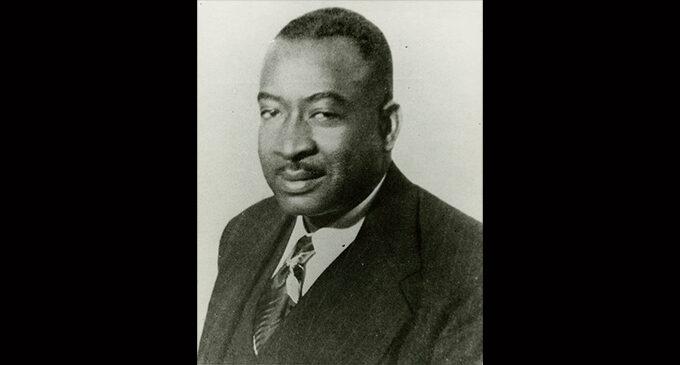The story behind the song ‘Precious Lord, Take My Hand’
Thomas A. Dorsey

By David Winship
Thomas A. Dorsey was born in Villa Rica, Georgia, west of Atlanta, in 1899, one of three children. His parents were educated, his father a graduate of Atlanta Bible College, now Morehouse College, and was a farmer, a preacher, and a teacher. His mother played organ for church services at Mt. Prospect Baptist Church. His uncle was a musician who played country blues.
Dorsey moved to Chicago at age 20 and found employment playing piano in vaudeville shows and bars, including one of Al Capone’s speakeasies. He also studied music at the College of Composition and Arranging. Dorsey played the blues circuit, performing as “Georgia Tom” with the likes of Tampa Red and as a member of Ma Rainey’s band. The first composition he copyrighted, perhaps the first copyrighted blues song, was “If you don’t believe I’m leaving, You can count the days I’m gone.”
During his first years in Chicago, his companion musician was often Tampa Red with whom he formed “The Hokum Boys,” which had a blues recording career from 1928-32. Hokum was an emerging form of blues associated with barrelhouse piano playing, primarily in bars. It used creative metaphor to put the blue in blues.
During the 1921 National Baptist Convention, Dorsey re-joined the church and began to write gospel songs, inspired by the music he heard. He was later to say that gospel music and the blues were the same, except for the lyrics. He considered the gospel songs as companions to the spoken word preaching. His blues-tinged gospel music that he published began with “If you see my Savior, tell Him you saw me.” He’d had a difficult time supporting himself and his family with gospel songs and he had continued to work in the blues vein.
He became a music teacher and choir master and traveled from Chicago to other cities to teach. While in St. Louis in 1932 teaching at at music school, he received word that his wife had died in childbirth and by the time he reached Chicago, his son had died a day later. Following the death of his wife and child, Dorsey later sued the hospital, but their only response was that, in the future, they would not serve Blacks.
Dorsey was unconsolable. He felt that “God had done me an injustice … I felt that I didn’t want to serve Him anymore or write any more gospel songs.” Having felt this, the next weekend he went to visit a friend and in the friend’s music room, he felt the Spirit move. He described it as “a strange feeling” coming over him, bringing a sudden calm and a quiet stillness. In that moment, he began to compose at the piano keyboard. “As my fingers began to manipulate over the keys, words began to fall into place on the melody like drops of water from the crevice of the rock.”
Precious Lord, take my hand,
Lead me on, help me stand,
I am tired, I am weak, I am worn . . .
Thomas A. Dorsey is considered “The Father of Gospel Music.” During his fifty-year career, he composed over 1,000 gospel songs. He introduced musical improvisation and encouraged personal participation with the music, including clapping, stomping and shouting, which at that time was considered base and un-church-like. He founded the National Convention of Gospel Choirs and Choruses to train musicians. Dorsey combined the good news of gospel with the bad news of the blues. He trained the first generation of gospel singers, including Mahalia Jackson, Sally Martin, Roberta Martin, and James Cleveland.
This popularization of gospel blues influenced the music in many Black churches and subsequently influenced American music culture.
David Winship lives in Bristol, Tennessee, and is a retired public-school educator. He is worship leader at Charles Wesley United Methodist Church in Abingdon, Virginia. He is a member of Winston-Salem Writers.









